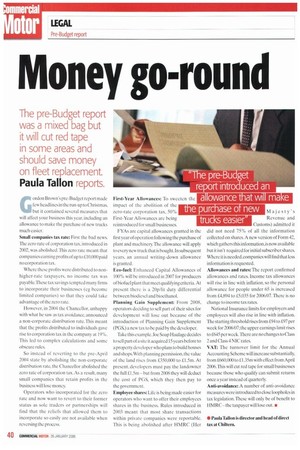Money go-round
Page 40

If you've noticed an error in this article please click here to report it so we can fix it.
The pre-Budget report was a mixed bag but it will cut red tape in some areas and should save money on fleet replacement.
Paula Tallon reports.
ordon Brown s pre-Budget report made
few headlines in the run-up to Christmas, VIM but it contained several measures that will affect your business this year, including an allowance to make the purchase of new trucks much easier.
Small companies tax rate: First the had news. The zero rate of corporation tax, introduced in 2002, was abolished. This zero rate meant that companies earning profits of up to £10.0(X) paid no corporation tax.
Where these profits were distributed to nonhigher-rate taxpayers, no income tax was payableAltese tax savings tempted many firms to incorporate their businesses (eg become limited companies) so that they could take advantage of the zero rate.
1 lowever, in 2004 the Chancellor, unhappy with what he saw as tax avoidance, announced a non-corporate distribution rate. This meant that the profits distributed to individuals gave rise to corporation tax in the company at 19%. This led to complex calculations and some obscure rules So instead of reverting to the pre-April 2004 state by abolishing the non-corporate distribution rate. the Chancellor abolished the zero rate of corporation tax. As a result, many small companies that retain profits in the business will lose money.
Operators who incorporated for the zero rate and now want to revert to their former status as sole traders or partnerships will find that the reliefs that allowed them to incorporate so easily are not available when reversing the process. First-Year Allowances: To sweeten impact of the abolition of the zero-rate corporation tax, 50% First-Year Allowances are being reintroduced for small businesses.
FYAs are capital allowances granted in the first year of operation following the purchase of plant and machinery.The allowance will apply to every new truck that is bought. In subsequent years, an annual writing-down allowance is granted.
Eco-fuel: Enhanced Capital Allowances of 100% will be introduced in 2007 for producers of hiofuel plant that meet qualifying criteria. At present there is a 20p/lit duty differential between biodiesel and bioethanol.
Planning Gain Supplement: From 2008, operators deciding to sell part of their sites for development will lose out because of the introduction of Planning Gain Supplement (PGS,) a new tax to be paid by the developer.
Take this example. Joe Soap Haulage decides to sell part of a site it acquired 15 years before to a property developer who plans to build houses and shops. With planning permission, the value of the land rises from £350,000 to 1:1.5m. At present. developers must pay the landowner the full £1.5 m — but from 2008 they will deduct the cost of PGS, which they then pay to the government.
Employee shares: Life is being made easier for operators who want to offer their employees shares in the business. Rules introduced in 2003 meant that most share transactions within private companies were reportable. This is being abolished after HMRC (Her Majesty's Revenue and Customs) admitted it did not need 75% of all the information collected on shares. A new version of Form 42, which gathers this information, is now available hut it isn't required for initial subscri her shares Where it is needed.companies will find that less information is requested.
Allowances and rates: The report confirmed allowances and rates. Income tax allowances will rise in line with inflation, so the personal allowance for people under 65 is increased from £4,894 to £5,035 for 2006/07. There is no change to income tax rates National Insurance limits for employers and employees will also rise in line with inflation. The starting threshold rises from £94 to £97 per week for 2006/07; the upper earnings limit rises to £645 per week. There are no changes to Class 2 and Class 4 N1C rates.
truc easier
VAT: The turnover limit for the Annual Accounting Scheme will increase substantially, from £660.000 to £1.35m with effect from April 2006:Ibis will cut red tape for small businesses because those who qualify can submit returns once a year instead of quarterly.
Anti-avoidance: A number of anti-avoidance measures were introduced to close loopholes in tax legislation. These will only be of benefit to HMRC— the taxpayer will lose out. •
































































































































































































